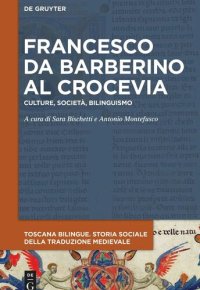
Ebook: Francesco da Barberino al crocevia: Culture, società, bilinguismo
Author: Sara Bischetti (editor), Antonio Montefusco (editor), European Research Council (ERC) (editor)
- Series: Toscana Bilingue. Storia sociale della traduzione medievale / Bilingualism in Medieval Tuscany, 1
- Year: 2021
- Publisher: De Gruyter
- Language: Italian
- pdf
Open Access
Francesco da Barberino, a contemporary of Dante (1264–1348), was a Florentine notary. Remembered for the first testimony of the circulation of the Commedia, he is also known for an ample and composite literary production, both in Latin and the vernacular. Francesco spent part of his life as notary at the service of the bishops of Florence, so that his works reveal a remarkable culture, influenced by his juridical training and notarial career. In particular, his allegorical and didactical poem, called Documenta Amoris, represents an interesting case of a complex interplay of texts and pictorial illustrations. In fact, the work includes a vernacular poem alongside a translation and a commentary both in Latin, and it is also accompanied by a series of illuminations: all the texts and the whole paratextual structure derive directly from the author himself, as witnessed by two Vatican MSS (Barb. 4076 and 4077). Composed at the same time, the Documenta Amoris are a sort of orthodox contrappunto of the Commedia, in which Dante’s linguistic experimentation is substituted by Francesco’s rigid bilingualism. This book provides one of the first interpretations of this fundamental figure of 14th-century Florentine culture.